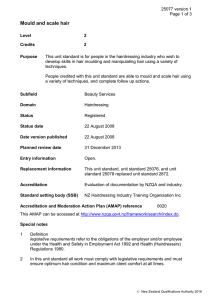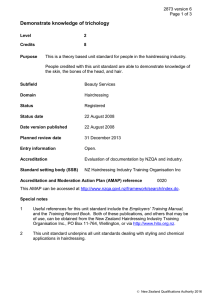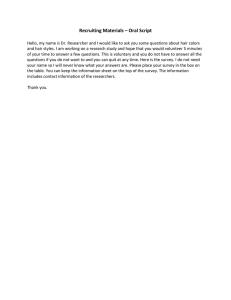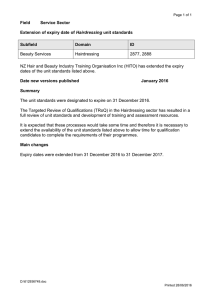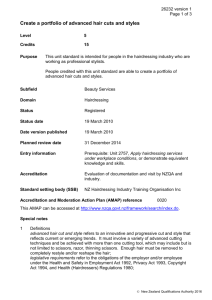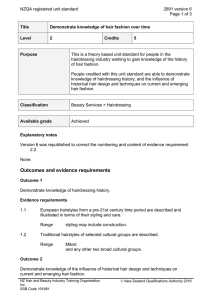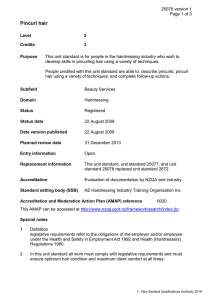NZQA registered unit standard 2866 version 6 Page 1 of 4
advertisement
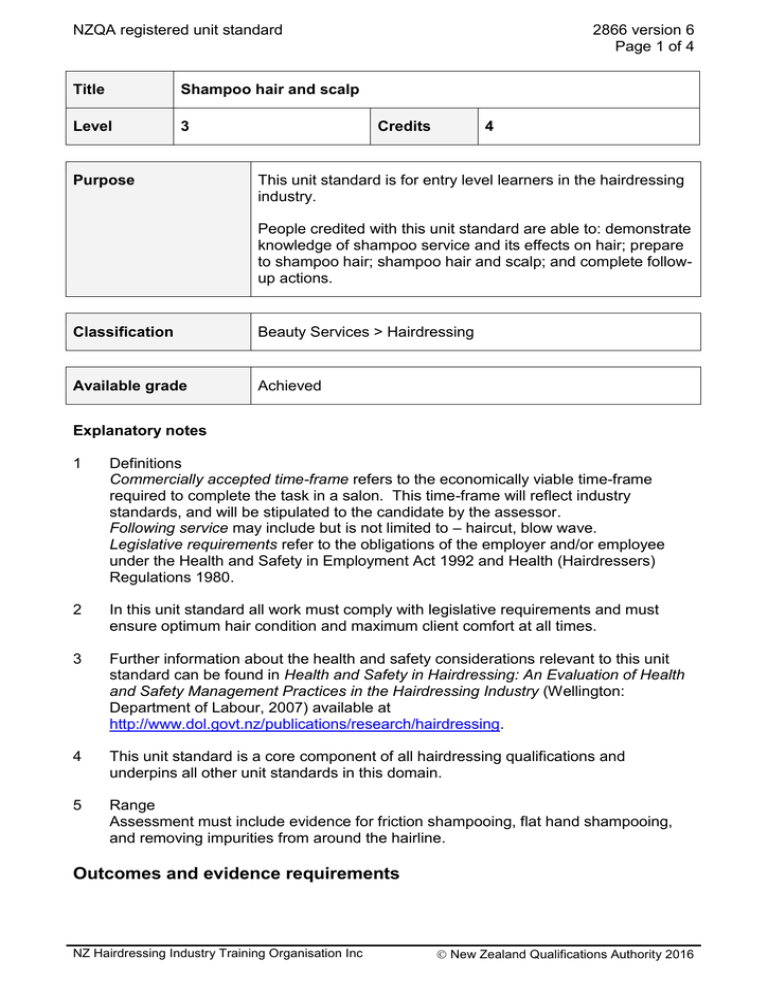
NZQA registered unit standard Title Shampoo hair and scalp Level 3 Purpose 2866 version 6 Page 1 of 4 Credits 4 This unit standard is for entry level learners in the hairdressing industry. People credited with this unit standard are able to: demonstrate knowledge of shampoo service and its effects on hair; prepare to shampoo hair; shampoo hair and scalp; and complete followup actions. Classification Beauty Services > Hairdressing Available grade Achieved Explanatory notes 1 Definitions Commercially accepted time-frame refers to the economically viable time-frame required to complete the task in a salon. This time-frame will reflect industry standards, and will be stipulated to the candidate by the assessor. Following service may include but is not limited to – haircut, blow wave. Legislative requirements refer to the obligations of the employer and/or employee under the Health and Safety in Employment Act 1992 and Health (Hairdressers) Regulations 1980. 2 In this unit standard all work must comply with legislative requirements and must ensure optimum hair condition and maximum client comfort at all times. 3 Further information about the health and safety considerations relevant to this unit standard can be found in Health and Safety in Hairdressing: An Evaluation of Health and Safety Management Practices in the Hairdressing Industry (Wellington: Department of Labour, 2007) available at http://www.dol.govt.nz/publications/research/hairdressing. 4 This unit standard is a core component of all hairdressing qualifications and underpins all other unit standards in this domain. 5 Range Assessment must include evidence for friction shampooing, flat hand shampooing, and removing impurities from around the hairline. Outcomes and evidence requirements NZ Hairdressing Industry Training Organisation Inc New Zealand Qualifications Authority 2016 NZQA registered unit standard 2866 version 6 Page 2 of 4 Outcome 1 Demonstrate knowledge of shampoo service and its effects on hair. Evidence requirements 1.1 The shampoo molecule is described in terms of its effect on hair. 1.2 Acid and alkaline shampoos are described in terms of their effect on the hairshaft. 1.3 The pH scale is identified and described in terms of acidity and alkalinity. 1.4 External conditioner is described in terms of its effect on the hairshaft. Outcome 2 Prepare to shampoo hair. Evidence requirements 2.1 Consultation with the client identifies and confirms work needed. 2.2 The hair and scalp are analysed. Range porosity, elasticity, texture, density, length, scalp conditions, previous product build-up. 2.3 Products are selected that match hair and scalp analysis and following service requirements. 2.4 The client is protected against water and/or product spillage. 2.5 Hair is prepared for shampooing in accordance with selected procedure and to ensure maximum hair condition. Range brushing, removal of accessories, products. Outcome 3 Shampoo hair and scalp. Range includes – shampooing long hair, shampooing prior to chemical treatment, shampooing lightened hair, one other. Evidence requirements 3.1 Hair is shampooed and conditioned in accordance with manufacturer's instructions, client’s needs and following service requirements. 3.2 The shampoo service is completed within a commercially accepted time-frame., in accordance with manufacturer’s instructions. NZ Hairdressing Industry Training Organisation Inc New Zealand Qualifications Authority 2016 NZQA registered unit standard 2866 version 6 Page 3 of 4 Outcome 4 Complete follow-up actions. Evidence requirements 4.1 Hair is prepared for following service. may include but is not limited to – towel dried, combed, product applied. Range 4.2 Tools and equipment are sanitised in accordance with workplace requirements. 4.3 The work area is cleaned and tidied in accordance with workplace requirements. work area – shampoo area, styling station. Range Planned review date 31 December 2019 Status information and last date for assessment for superseded versions Process Version Date Last Date for Assessment Registration 1 8 February 1995 31 December 2016 Revision 2 8 October 1996 31 December 2016 Review 3 19 December 1997 31 December 2016 Review 4 27 January 2003 31 December 2016 Review 5 22 August 2008 31 December 2016 Review 6 19 March 2015 N/A Consent and Moderation Requirements (CMR) reference 0020 This CMR can be accessed at http://www.nzqa.govt.nz/framework/search/index.do. Please note Providers must be granted consent to assess against standards (accredited) by NZQA, before they can report credits from assessment against unit standards or deliver courses of study leading to that assessment. Industry Training Organisations must be granted consent to assess against standards by NZQA before they can register credits from assessment against unit standards. Providers and Industry Training Organisations, which have been granted consent and which are assessing against unit standards must engage with the moderation system that applies to those standards. NZ Hairdressing Industry Training Organisation Inc New Zealand Qualifications Authority 2016 NZQA registered unit standard 2866 version 6 Page 4 of 4 Requirements for consent to assess and an outline of the moderation system that applies to this standard are outlined in the Consent and Moderation Requirements (CMRs). The CMR also includes useful information about special requirements for organisations wishing to develop education and training programmes, such as minimum qualifications for tutors and assessors, and special resource requirements. Comments on this unit standard Please contact NZ Hairdressing Industry Training Organisation Inc at enquiries@hito.org.nz if you wish to suggest changes to the content of this unit standard. NZ Hairdressing Industry Training Organisation Inc New Zealand Qualifications Authority 2016
